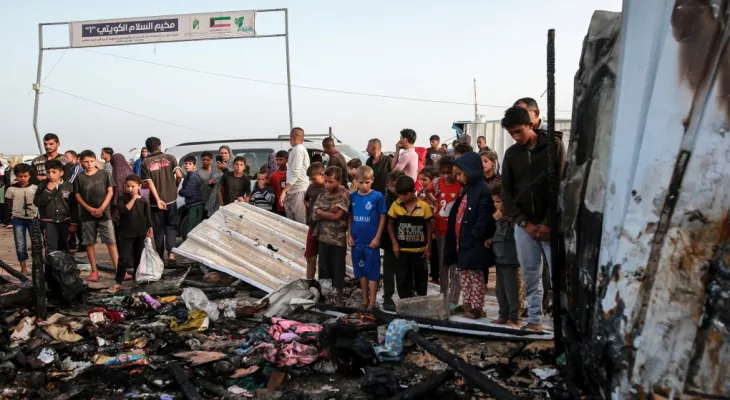Search here
Newspaper
Search here

Arab Canada News
News

Published: May 29, 2024
Israeli tanks launched raids throughout Rafah in a clear challenge to the International Court of Justice for the second consecutive day on Wednesday after Washington stated that the attack did not constitute a major ground operation in the city of Gaza in southern Gaza, warning Israeli officials to avoid it.
Israel sent its tanks into the heart of Rafah for the first time on Tuesday despite a ruling from the International Court of Justice to halt its attacks on the city, where many Palestinians sought refuge from the widespread bombardment.
The United States, Israel's closest ally, reiterated its opposition to a major Israeli ground assault in Rafah but said on Tuesday that it did not believe such an operation was underway.
Residents of Rafah reported on Wednesday that Israeli tanks had penetrated into Tal al-Sultan in western Rafah, Yebna, and near al-Shaboura in the center before retreating towards a buffer zone on the border with Egypt, in contrast to the assaults in other areas.
Tzachi Hanegbi, adviser to Israeli Prime Minister Benjamin Netanyahu for national security, stated that the Israeli army controlled three-quarters of the buffer zone and aimed to seize it all to prevent Hamas from smuggling weapons.
He added that he expects the fighting in Gaza to continue throughout 2024 at least, indicating that Israel is not prepared to respond to international calls to agree to a ceasefire with Hamas militants who govern Gaza and to exchange the hostages they hold for Palestinian prisoners.
The armed wings of Hamas and its allies from the Islamic Jihad Movement stated that they confronted the invading forces with anti-tank missiles, mortars, and detonated previously planted explosives.
The Israeli army reported that three soldiers were killed and three others were seriously injured in the fighting in southern Gaza without divulging details. Israel's Kan public radio stated that the three were injured due to the explosion of a bomb in a building in Rafah.
Palestinian health officials reported that several people were injured by Israeli fire in eastern Rafah, and warehouses of aid were set ablaze. Residents mentioned that ongoing Israeli bombardment during the night destroyed many homes in the area, from which most people fled following Israeli evacuation orders.
Some residents reported seeing what they described as unmanned armored vehicles firing from machine guns in parts of the city.
Residents and other journalists noted that internet and mobile phone signals were cut off in parts of the east and west amidst intense Israeli air and ground bombardment. The Israeli army stated that it could not confirm these reports.
In northern Gaza, tanks shelled several neighborhoods in Gaza City and troops infiltrated Jabalia, the largest of the eight historic refugee camps in the sector, where residents reported that large residential areas were destroyed.
The Gaza Health Ministry reported that several hospitals in the areas where the army was operating had ceased functioning. Its spokesperson, Ashraf al-Qudra, called for immediate safe passages to deliver fuel, medical supplies, and medical teams to Rafah and northern Gaza.
Al-Qudra's statement said, "The Israeli occupation intentionally terminated the health presence in Rafah and the north," adding that there was no assistance for the injured there.
The United Nations Relief and Works Agency (UNRWA) reported on Tuesday that around a million Palestinians had sought refuge in Rafah at the southern end of the Gaza Strip, fleeing Israeli attacks elsewhere, but they are now fleeing again following Israeli evacuation orders.
The Palestinian Red Crescent Society indicated that it evacuated its medical teams from the field hospital in the Mawasi area, designated for civilian evacuations, citing "continuing artillery and air bombardment" in the neighboring area.
The international court, in its ruling issued on Friday, stated that Israel had not clarified how it would maintain the safety of evacuated Rafah residents and provide food, water, and medicine. Israel claimed that the order allows for some military actions to eliminate Hamas fighters there.
In the nearby city of Khan Younis, paramedics and Hamas-affiliated media stated that an Israeli air raid killed three people overnight, including Salama Baraka, a senior former Hamas police officer.
The Palestinian Red Crescent reported that one of its staff members, Essam Aql, was killed in an Israeli airstrike on his home in the al-Bureij refugee camp in central Gaza, raising the number of staff killed since October 7 to 30, of whom at least 17 were killed while on duty.
A source familiar with the matter stated that Israel delivered its latest proposals for a ceasefire and the release of hostages to Qatar, which is set to present it to Hamas on Tuesday. There was no immediate comment on Wednesday from Hamas, which stated that the negotiations would be futile unless Israel halted its assault on Rafah.
The Health Ministry in the sector announced that more than 36,000 Palestinians had been killed in the Israeli attack on Gaza.
Israel launched its air and ground war after militants led by Hamas attacked communities in southern Israel on October 7, resulting in the deaths of approximately 1,200 people and the capture of over 250 hostages, according to Israeli statistics.
Widespread malnutrition is prevalent in Gaza as the delivery of aid has significantly slowed, with international relief agencies accusing Israel of obstructing their distribution efforts, while Israel blames those agencies.
Two American officials stated on Tuesday that, in another blow to relief efforts, part of a newly established aid pier set up by the U.S. military off the coast of Gaza has become nonoperational, possibly due to bad weather, leading to a temporary shutdown.
Comments